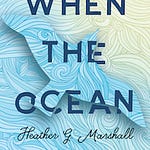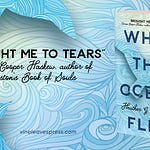“Now, in the infancy of a new century, we find footing in a world built by the men who came before, still much of our truth buried, fossils of the soul.” —Eilidh, from When the Ocean Flies, p 311
In my last post about Story and Self, I focused on the impact of having our stories—personal and cultural—altered, buried, or eradicated. I noted the distrust of Self and sense of not belonging that takes hold. When we can’t access or speak our own truth, we experience a violation of one of our most basic rights—the right to our own perspective, experience, voice. With no voice, we have no agency.
The post focused on adoptees, but this experience, is not, obviously, exclusive to those of us who have been relinquished by/taken from our biological families and/or cultures of origin. The post also included an excerpt from another of Eilidh’s letters in When the Ocean Flies, in which she mentions the buried stories of women. In particular, she cites the witch trials in Scotland as a final ending of our ability as women to claim our power and tell our stories.
As I was busy pondering buried stories and voice and women and witches, a friend who had no idea about these wonderings sent me a delightfully serendipitous link to “The Witches Well”. It’s an episode of Witch, a BBC podcast, that focuses on the Scottish Witch Trials, which led me to the fabulous Witches of Scotland podcast and movement, in which Claire Mitchell QC and Zoe Venditozzi dig into the hidden/buried/eradicated stories of the people (primarily women) who were accused of being witches. In the opening episode of the podcast, they visit a small and obscured statue that (sort of) commemorates the trials, and they note that most people don’t even know there’s a hidden story. They set out to tell these stories in hopes of getting an apology, a pardon, and a national memorial.
“To date, there has been no official apology for those people who suffered this brutal miscarriage of justice. Their story has been lost in a history written by men.”—Mitchell & Venditozzi, Witches of Scotland
Despite the many barriers to the stories of the accused—missing or destroyed court records, for instance—the podcast speaks as much of the accused people’s truth as they can gather, bringing to light a strand of our collective story as Scots and as women that has been buried, offering a new lens through which we can see our past and thus understand our present. With this more whole understanding, we are better equipped to envision our future.
This is true on a personal level as well. Many of us wander through our lives, feeling that we don’t quite fit or that we aren’t quite empowered or deserving of the lives we want or that something is missing, and thinking there’s something wrong with us when what’s missing is a crucial part of our story. We have become over acculturated by a history written by others and by standards that feel ill-fitting. There’s nothing wrong with us; there’s something wrong with the story we’ve been told about ourselves and thus the lives we’ve thought we must live.
“I did not fully realize how much of that I’d done to myself until after Hamish died. He was a good man. It wasn’t even conscious that I held myself in for him. I loved him. Did as I was told to do. After his death, though, I felt myself begin to unfurl. I returned to reading the cards, returned to reading the air and the sky. Began to find my voice in paint and canvas and here, on these pages.”—Eilidh, from When the Ocean Flies, p 311
Even when we have barriers to historical documents, like birth certificates in the case of most US adoptees, we have our lived experience and our memories as a place to begin to challenge the prevailing narrative. As soon as we put pen to page, we claim our right to our own voice, our right to our truth, our agency, our belonging.
Instead of having someone or some entity outside ourselves choose our narrative lens and thus the way we see ourselves, we take charge. We are no longer a character in someone else’s story; we are the author of our own. When we do this, we also become the authors of our lives, consciously choosing how we view ourselves and how we move our story (and our Selves) forward, in ways that are resonant and nourishing.
If this notion resonates with you, here’s a wee prompt to get you started on your own authorial journey: What story—personal, familial, cultural, historical—have you gone along with that does not feel resonant or completely true for you? If you were to write it, what would you say?
If you’re an adoptee and this sounds like a journey you’d like to explore with some guidance, I have a new round of classes starting in October. They’re free. I’ll post more details soon. If you’d like to know now, though, you can get details on my website and sign up there, too.
If this sounds like something you’d like to explore and you’re not an adoptee, send me a message here and we’ll get something going.
I’d love to hear from you about what calls you to write.
You Belong.
You can write your own story.
You can be the author of your life.
xox







Share this post